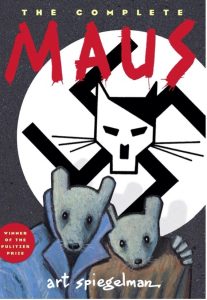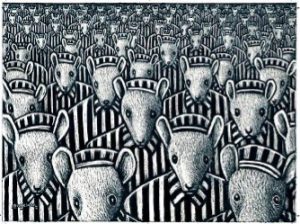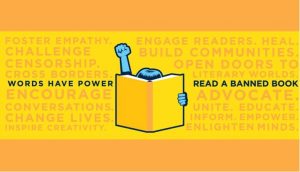It is a ban of sorts to use authority to keep people from things. Yes, it’s a ban.
–Art Spiegelman, author of Maus: A Survivor’s Tale
It’s painful to me because what I know is that when these books are banned, there are going to be thousands and thousands of young people who will not get these books.
–Jason Reynolds, author of Stamped: Racism, Antiracism, and You, and All American Boys
I get a lot of uproariously innocent “how dare they?”s and “but why would anyones?” They clearly do dare. And we know exactly why.
–Alex Gino, author of George (Melissa’s Story)
Maus and Current Book Banning Controversies
You may have heard about the recent banning of a book called Maus: A Survivor’s Tale by a school board in Tennessee’s McMinn County. The renowned graphic novel, which depicts the atrocities of the Holocaust using mice and cats, was authored by Art Spiegelman, himself the son of Holocaust survivors. Banned for “profanity and nudity,” the loss of the book in McMinn’s eighth-grade school curriculum caused outrage, as many defended the book for its powerful depiction of the reality of the Holocaust and accessibility for students. Spiegelman himself expressed disbelief over the censure, telling one interviewer, “This is disturbing imagery. But you know what? It’s disturbing history.”
Maus is most certainly not the only book that has come under fire in recent months. Many of the most challenged books of today are written for children and young adults, or included in their school curriculum. Conversations around book banning often intersect with other educational movements, including critical race theory, antiracist education, and LGBTQ+ community activism. Emily Knox, a professor at the University of Illinois who studies how and why books get challenged, explained to NPR Illinois, “people [are] unsure if their values are being transmitted to the next generation, and perhaps we can make sure that they are transmitted if we don’t have students read these books.” While these conversations will always be woven into the fabric of education, we know that banning books removes diversity, history (including disturbing history), and valuable life experiences from school curriculums, libraries, and classrooms. Kids need books that will be contextualized, helping expand their imaginations and knowledge.
Book Banning Isn’t New
The banning of Maus, and the backlash around it, is part of a long, long, long history. Challenging and banning books has been around… well, for about as long as there have been books. Throughout history, the powerful have often used book bans to symbolize their own strength, preserve “traditional values,” and exert control over the majority. Books have been burnt, shredded, ripped apart, defaced, challenged, and yes, banned, all in the name of censoring information.
You can find out more about the history of book banning from Lindsay Ellis and Princess Weekes at PBS’ Storied: https://www.youtube.com/watch?v=xpKqRC-9Avc
What Can You Do?
Here are five ways you can protect freedom of expression and advocate against book bans:
- Contact your local school board. Let those in power know that you are in favor of keeping challenged books available to all students. You can contact the Champaign or Urbana Board of Education via email.
- Support librarians and teachers. Librarians and teachers are on the front lines of the debates around challenging and banning books. Let them know that you support them!
- Support challenged authors. Have you read a banned book that inspired you? Let the author know! The ALA Office for Intellectual Freedom has more information at Dear Banned Author.
- Use #BannedBooksWeek. Share your favorite #BannedBooks on Twitter, Instagram, and TikTok, and spread the word on the importance of the freedom to read!
- Read widely and read wildly. Read books that challenge you, ignite you, and infuriate you. The best defense is to keep reading.
Written by: Aine
Posted by: Loida





